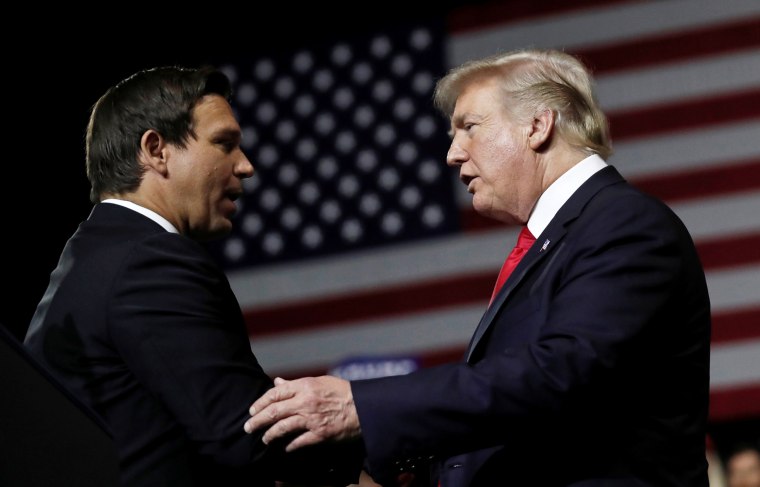Florida is on track to be the first state in the nation to punish social media companies that ban politicians like former President Donald Trump under a bill approved Thursday by the state's Republican-led Legislature.
Gov. Ron DeSantis, a Republican and close Trump ally who called for the bill’s passage, is expected to sign the legislation into law, but the proposal appears destined to be challenged in court after a tech industry trade group called it a violation of the First Amendment speech rights of corporations.
Republicans have been barraging Twitter, Facebook, YouTube and other tech companies for booting Trump and other conservatives from their platforms after violations of the companies’ rules, including bans on the promotion of violence related to the Jan. 6 attack on the U.S. Capitol.
Republicans have called social media bans unfair censorship, and this month Supreme Court Justice Clarence Thomas came close to agreeing, writing in an opinion that legislators could be justified if they passed laws requiring social media to carry all views.
The Florida bill would prohibit social media companies from knowingly “deplatforming” political candidates, meaning a service could not “permanently delete or ban” a candidate. Suspensions of up to 14 days would still be allowed, and a service could remove individual posts that violate its terms of service.
The state's elections commission would be empowered to fine a social media company $250,000 a day for statewide candidates and $25,000 a day for other candidates if a company's actions are found to violate the law, which also requires the companies to provide information about takedowns and apply rules consistently. The proposed fines were lower in the original bill, but on Tuesday the Florida state House raised them in an amendment.
Florida Republican lawmakers have cited tech companies' wide influence over speech as a reason for the increased regulation.
"What this bill is about is sending a loud message to Silicon Valley that they are not the absolute arbiters of truth," state Rep. John Snyder, a Republican from the Port St. Lucie area, said Wednesday.
"What this bill does is send a loud message that the Constitution does not have an asterisk that says only certain speech is free and protected," he said.
The Florida House voted 77-38 in favor of the bill, the Senate, 23-17.
Facebook and other social media services have long, often elaborate rulebooks for governing what's allowed on their platforms, which the companies regulate as private forums. But as more political speech has moved online, enforcing those rules consistently and without major pushback has become a constant challenge.
The Florida bill may offer Republicans in other states a road map for introducing laws that could eventually force social media companies and U.S. courts to confront questions about free speech on social media, including the questions raised by Thomas.
State Rep. Carlos Guillermo Smith, an Orlando area Democrat, said if Republicans want to stay on private services, they should follow the rules.
"There's already a solution to deplatforming candidates on social media: Stop trafficking in conspiracy theories. That's the solution. Stop pushing misinformation if you're a candidate or an incumbent elected official. Stop retweeting QAnon. Stop lying on social media," Smith said.
"Stop inciting insurrection against our republic. We're hearing this bill because Twitter finally deplatformed former President Trump after five people were killed in an insurrection he incited at the U.S. Capitol."
NetChoice, a trade group for internet companies, testified against the legislation and has argued that private entities should have the right to decide what’s best for users without interference.
"The First Amendment makes clear that government may not regulate the speech of private individuals or businesses. This includes government action that compels speech by forcing a private social media platform to carry content that is against its policies or preferences,” NetChoice President Steve DelBianco said in testimony last month.
He also said that the proposal wrongly punishes social media platforms for removing harmful content, and that it would make it far more difficult to block spam.

